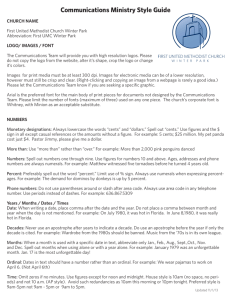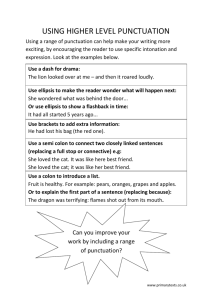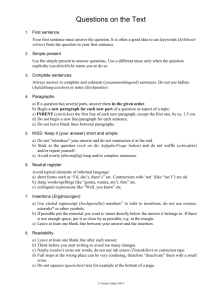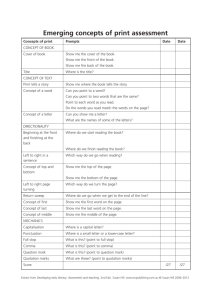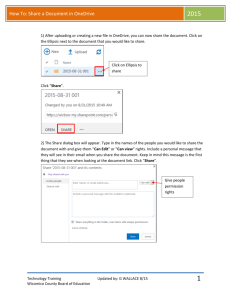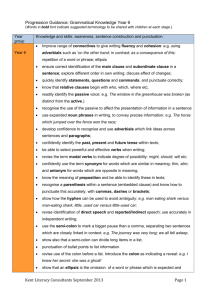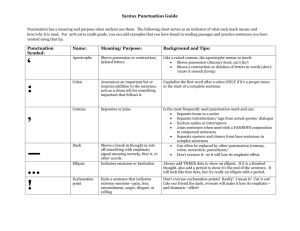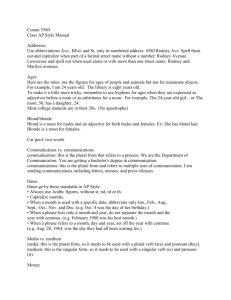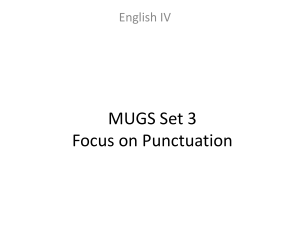Grammar Rules - Miami Beach Senior High School
advertisement
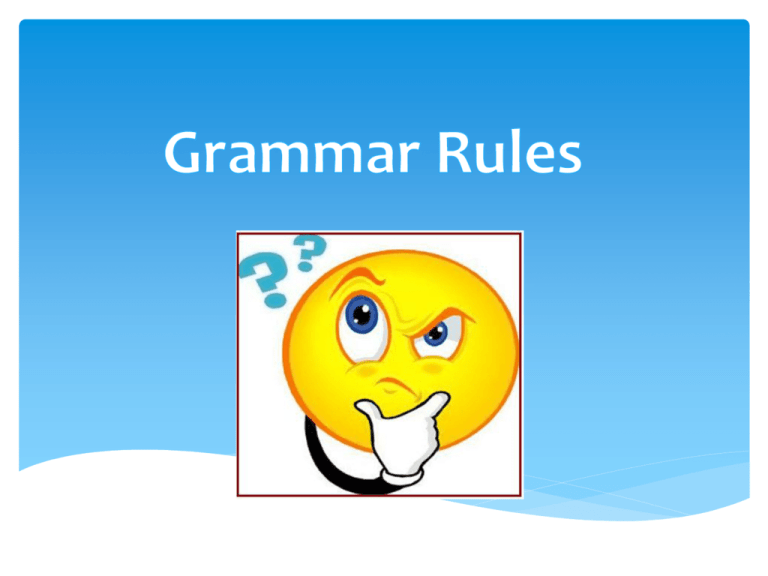
Comma Use a comma to join 2 independent clauses by a comma and a coordinating conjunction (and, but, or, for, nor, so). Road construction can be inconvenient, but it is necessary. The new house has a large fenced backyard, so I am sure our dog will enjoy it. Use a comma after an introductory phrase, prepositional phrase, or dependent clause. To get a good grade, you must complete all your assignments. Because Dad caught the chicken pox, we canceled our vacation. After the wedding, the guests attended the reception. Use a comma to separate elements in a series. Although there is no set rule that requires a comma before the last item in a series, it seems to be a general academic convention to include it. The examples below demonstrate this trend. On her vacation, Lisa visited Greece, Spain, and Italy. In their speeches, many of the candidates promised to help protect the environment, bring about world peace, and end world hunger. Use a comma to separate nonessential elements from a sentence. More specifically, when a sentence includes information that is not crucial to the message or intent of the sentence, enclose it in or separate it by commas. John's truck, a red Chevrolet, needs new tires. When he realized he had overslept, Matt rushed to his car and hurried to work. Use a comma between coordinate adjectives (adjectives that are equal and reversible). The irritable, fidgety crowd waited impatiently for the rally speeches to begin. The sturdy, compact suitcase made a perfect gift. Use a comma after a transitional element (however, therefore, nonetheless, also, otherwise, finally, instead, thus, of course, above all, for example, in other words, as a result, on the other hand, in conclusion, in addition). For example, the Red Sox, Yankees, and Indians are popular baseball teams. If you really want to get a good grade this semester, however, you must complete all assignments, attend class, and study your notes. Use a comma with quoted words. "Yes," she promised. Todd replied, saying, "I will be back this afternoon." Use a comma in a date. October 25, 1999 Monday, October 25, 1999 25 October 1999 Use a comma in a number. 15,000,000 1614 High Street Use a comma in a personal title. Pam Smith, MD Mike Rose, Chief Financial Officer for Operations, reported the quarter's earnings. Use a comma to separate a city name from the state. West Lafayette, Indiana Dallas, Texas Avoid comma splices (two independent clauses joined only by a comma). Instead, separate the clauses with a period, with a comma followed by a coordinating conjunction, or with a semicolon. Semicolon; Use a semicolon to join 2 independent clauses when the second clause restates the first or when the two clauses are of equal emphasis. Road construction in Dallas has hindered travel around town; streets have become covered with bulldozers, trucks, and cones. Use a semicolon to join 2 independent clauses when the second clause begins with a conjunctive adverb (however, therefore, moreover, furthermore, thus, meanwhile, nonetheless, otherwise) or a transition (in fact, for example, that is, for instance, in addition, in other words, on the other hand, even so). Terrorism in the United States has become a recent concern; in fact, the concern for America's safety has led to an awareness of global terrorism. Terrorism in the United States has become a recent concern; in fact, the concern for America's safety has led to an awareness of global terrorism. Recent sites of the Olympic Games include Athens, Greece; Salt Lake City, Utah; Sydney, Australia; Nagano, Japan. For more information on semicolons, please see the "90Second Semicolon" vidcast series on the Purdue OWL YouTube Channel. Colon Use a colon to join 2 independent clauses when you wish to emphasize the second clause. Road construction in Dallas has hindered travel around town: parts of Main, Fifth, and West Street are closed during the construction. Use a colon after an independent clause when it is followed by a list, a quotation, appositive, or other idea directly related to the independent clause. Julie went to the store for some groceries: milk, bread, coffee, and cheese. In his Gettysburg Address, Abraham Lincoln urges Americans to rededicate themselves to the unfinished work of the deceased soldiers: "It is for us the living rather to be dedicated here to the unfinished work which they who fought here have thus far so nobly advanced. It is rather for us to be here dedicated to the great task remaining before us — that from these honored dead we take increased devotion to that cause for which they gave the last full measure of devotion — that we here highly resolve that these dead shall not have died in vain, that this nation under God shall have a new birth of freedom, and that government of the people, by the people, for the people shall not perish from the earth." I know the perfect job for her: a politician. Use a colon at the end of a business letter greeting. To Whom It May Concern: Use a colon to separate the hour and minute(s) in a time notation. 12:00 p.m. Use a colon to separate the chapter and verse in a Biblical reference. Matthew 1:6 Parenthesis ( ) Parentheses are used to emphasize content. They place more emphasis on the enclosed content than commas. Use parentheses to set off nonessential material, such as dates, clarifying information, or sources, from a sentence. Muhammed Ali (1942-present), arguably the greatest athlete of all time, claimed he would "float like a butterfly, sting like a bee." Dash Dashes are used to set off or emphasize the content enclosed within dashes or the content that follows a dash. Dashes place more emphasis on this content than parentheses. Perhaps one reason why the term has been so problematic—so resistant to definition, and yet so transitory in those definitions—is because of its multitude of applications. In terms of public legitimacy—that is, in terms of garnering support from state legislators, parents, donors, and university administrators—English departments are primarily places where advanced literacy is taught. The U.S.S. Constitution became known as "Old Ironsides" during the War of 1812—during which the cannonballs fired from the British H.M.S. Guerriere merely bounced off the sides of the Constitution. To some of you, my proposals may seem radical—even revolutionary. Use a dash to set off an appositive phrase that already includes commas. An appositive is a word that adds explanatory or clarifying information to the noun that precedes it. The cousins—Tina, Todd, and Sam—arrived at the party together. Quotation Marks Use quotation marks to enclose direct quotations. Note that commas and periods are placed inside the closing quotation mark, and colons and semicolons are placed outside. The placement of question and exclamation marks depends on the situation. He asked, "When will you be arriving?" I answered, "Sometime after 6:30." Use quotation marks to indicate the novel, ironic, or reserved use of a word. History is stained with blood spilled in the name of "justice." Use quotation marks around the titles of short poems, song titles, short stories, magazine or newspaper articles, essays, speeches, chapter titles, short films, and episodes of television or radio shows. "Self-Reliance," by Ralph Waldo Emerson "Just Like a Woman," by Bob Dylan "The Smelly Car," an episode of Seinfeld Do not use quotation marks in indirect or block quotations. When to use periods 1. We use a period at the end of sentences that arestatements. A statement is a sentence that states, or tells, something. Examples: •I like to eat pizza. •School starts on Wednesday. •The baby's name is Grace. 3. We use a period at the end of sentences that are indirect questions. An indirect question is a question that is said as a statement. It uses a period instead of a question mark. Examples: •She asked me why I didn't go to school yesterday. •I wondered why Bob wasn't there. •Tim asked about that book. 2. We use a period at the end of sentences that are commands. A command is a sentence that tells someone to do something. Examples: •Pick up the blue ball. •Turn left at the next light. •Hand me the pencil. 4. We use periods in abbreviations. An abbreviation is a shortened version of a word or words. Examples: •United States of America is abbreviated U.S.A. •Mr. is the abbreviation for Mister. •Rd. is the abbreviation for road. 5. We use periods in website addresses. Examples: •www.dictionary.com •www.learnersdictionary.com •www.really-learn-english.com How to use a period in sentences 1) Do not put a space before a period used to end a sentence. •Correct: The shirt is blue. •Incorrect: The shirt is blue. 2) Do put one space after the period if it is followed by another sentence. •Correct: I am driving to the city. The city is north of here. •Incorrect: I am driving to the city. The city is north of here. •Incorrect: I am driving to the city. The city is Why is the period important? 1) If you do not use a period at the end of a sentence, each sentence will run into the next. That would create confusion for the speaker or reader. The period signals the end of a thought. Example without periods: •I visited my friend in the city she lives with her mom they rent an apartment on the south side of town we had a nice visit I hope I can return next year (You can breath now! :-) Example with periods: •I visited my friend in the city. She lives with her mom. They rent an apartment on the south side of town. We had a nice visit. I hope I can return next year. 2) Abbreviations without periods would be random letters placed together without making a word. The period or periods in an abbreviation signal to the reader that it is a shortened form of a word or words. 3) Websites will not work without periods. You must place a period in all correct places for the internet addresses to be correct. When to Use Ellipses The ellipsis, those three consecutive periods you often see in novels and news stories, is among the most misunderstood punctuation marks in use in the English language. It is used indiscriminately in text messages, instant messages, and e-mails, and social networking websites and blogs haven’t helped to curb the trend. However, the ellipsis is an actual punctuation mark that serves a particular use, in both formal and informal styles of writing. If using ellipses confuses you, try following some of these simple guidelines as to when ellipses should be used—and when they should not. How to Use an Ellipse Before discussing when ellipses are appropriately used, a few words on how the ellipsis is used are necessary. • An ellipsis makes up for a missing piece of text, or allows for a pause in writing. • According to various style guides, an ellipsis is three periods, with a space in between each [ . . . ]. In general, there is also a space before and after the ellipsis. Some style manuals prefer three dots with no spaces in between [ ... ], and others still prefer the auto-formatted version of the ellipsis, with less than a full space in between each dot […]. • Until very recently, the Modern Language Association require brackets before and after ellipses (as seen above); however, the use of such brackets has declined in recent years. Although brackets are still technically correct, they are largely deemed unnecessary. News Writing News stories compile information to disseminate to the population, and news agencies depend on the accuracy of a news story in order to gain the confidence of an audience. Sometimes when a quote is used in a news story, parts of the quote are unnecessary to the story. When a bit of a quote must be removed to improve the clarity or focus of a story, an ellipsis is used. If a fire broke out and a fire chief gave the following quote, most of the quote would likely be considered unnecessary: “we’ve determined positively, absolutely, beyond the shadow of a doubt, drawing our conclusions from all the available data, understanding the impact of the recent spate of arsons, that this fire was accidental,” Clarity and focus could be improved with an ellipsis: “we’ve determined positively … that this fire was accidental.” Formal Writing In formal writing, such as academic papers and published research, an ellipsis is used much to the same effect. Essentially, a quote might be too long or clunky to fit into a paper in its entirety. Instances such as these require an ellipsis to draw attention to the substance of a quote without damaging the quote’s integrity. For example, a discussion of search and seizure might invoke the Fourth Amendment (“The right of the people to be secure in their persons, houses, papers, and effects, against unreasonable searches and seizures, shall not be violated…”), but remove the unnecessary parts: “The right of the people to be secure … against unreasonable searches and seizures, shall not be violated….” Notice that if a sentence ends with an ellipsis, a final period is included for clarity. Informal Writing Stories and novels use ellipses to a very different effect. An ellipsis can demonstrate a pause in dialogue, a pause in narrative, or a character or a narrator trailing off. • “I’m not sure what to do…” he stammered” is a perfectly acceptable use of an ellipsis in such a case because it demonstrates the inability of the character to make up his mind. • A narrator might say of a character, “He was without hope… Desolate, empty… The epitome of a broken heart.” The format of these ellipses is not subject to formal guidelines; three dots followed by a space is usually appropriate. A pause in text appears much the same way. “She wasn’t angry … she was just tired.” This case uses an ellipsis similar to what would be used in a piece of news writing, but it is understood that the character who is speaking is merely pausing for emphasis or thought. No words were omitted from his or her dialogue. Ellipses An ellipsis is a series of three points with spaces between them (. . .) inserted into a quotation to indicate the omission of material from the original quotation. There are quite a few simple rules for the proper use of ellipses, which are used more often in legal writing than most forms of writing, since lawyers often (generally too often) quote material from other sources. Failure to use the proper form of an ellipsis could misrepresent the work of another person and result in legal liability for the writer. Correct use of ellipses, on the other hand, shows that the writer has carefully attended to detail, and thus increases the reader's confidence in the reliability of the written work. 1. When placing an ellipsis in the middle of a quotation to indicate the omission of material, use three points with spaces before and after the ellipsis. Correct: The First Amendment provides that "Congress shall make no law respecting . . . the right of the people peaceably to assemble, and to petition the Government for a redress of grievances." U.S. Const. amend. I. Incorrect: The First Amendment provides that "Congress shall make no law respecting. . .the right of the people peaceably to assemble, and to petition the Government for a redress of grievances." U.S. Const. amend. I. 2. When placing an ellipsis at the end of a quotation to indicate the omission of material, use four points -- a three-point ellipsis and a period. The ellipsis should follow a blank space. Correct: The First Amendment provides that "Congress shall make no law . . . abridging the freedom of speech . . . ." U.S. Const. amend. I. Incorrect: The First Amendment provides that "Congress shall make no law. . . abridging the freedom of speech. . ." U.S. Const. amend. I. 3. Do not place an ellipsis at the beginning of a quotation to indicate the omission of material. Correct: The First Amendment also prohibits laws "respecting an establishment of religion . . . ." U.S. Const. amend. I. Incorrect: The First Amendment provides that "Congress shall make no law. . . abridging the freedom of speech. . ." U.S. Const. amend. I. 4. When combining a fully quoted sentence with a partially quoted sentence, or with a second, but nonconsecutive quoted sentence, place a period at the end of the fully quoted sentence, followed by a space, an ellipsis, another space, and the remainder of the quoted material. Do not place a space before a period at the end of a fully quoted sentence. Correct: In a unanimous decision, Justice Holmes wrote, "The question in every case is whether the words used are used in such circumstances and are of such a nature as to create a clear and present danger that they will bring about the substantive evils that Congress has a right to prevent. . . . When a nation is at war many things that might be said in time of peace are such a hindrance to its effort that their utterance will not be endured so long as men fight and that no Court could regard them as protected by any constitutional right." Schenck v. United States, 249 U.S. 47, 52 (1919). Incorrect: In a unanimous decision, Justice Holmes wrote, "The question in every case is whether the words used are used in such circumstances and are of such a nature as to create a clear and present danger that they will bring about the substantive evils that Congress has a right to prevent . . . .When a nation is at war many things that might be said in time of peace are such a hindrance to its effort that their utterance will not be endured so long as men fight and that no Court could regard them as protected by any constitutional right." Schenck v. United States, 249 U.S. 47, 52 (1919). In the preceding series of quotations, the ellipsis in the middle of the two quotations indicates that one or more entire intervening sentences have been omitted. Correct: In a unanimous decision, Justice Holmes wrote, "The question in every case is whether the words used are used in such circumstances and are of such a nature as to create a clear and present danger that they will bring about the substantive evils that Congress has a right to prevent. . . . [T]heir utterance will not be endured so long as men fight and that no Court could regard them as protected by any constitutional right." Schenck v. United States, 249 U.S. 47, 52 (1919). Incorrect: In a unanimous decision, Justice Holmes wrote, "The question in every case is whether the words used are used in such circumstances and are of such a nature as to create a clear and present danger that they will bring about the substantive evils that Congress has a right to prevent. . . .their utterance will not be endured so long as men fight and that no Court could regard them as protected by any constitutional right." Schenck v. United States, 249 U.S. 47, 52 (1919). In the preceding example, the ellipsis indicates that some material -- it could be a whole sentence and the beginning of the next sentence, or just the beginning of the next sentence -- has been omitted in the midst of the quoted material. The brackets around the "T" indicate that the letter was lower case in the original and was changed to upper case by the writer to create a proper sentence. The brackets also confirm that material at the start of the second quoted sentence was omitted, because the letter "T" would have been capitalized in the original, and therefore would require no brackets, if it had started a sentence. For more information concerning the use of brackets, see the section of this tutorial on brackets. 5. When omitting one or more entire paragraphs, indicate the omission by indenting four points and placing them on a separate line. If the quoted material is 50 words or more, use indented margins and do not use any quotation marks. Poverty imposes costs on the nonpoor that warrant, on strictly economic grounds and without regard to ethical or political considerations, incurring some costs to reduce it. For example, poverty in the midst of a generally wealthy society is likely to increase the incidence of crime: the forgone income of a legitimate alternative occupation is low for someone who has little earning capacity in legitimate occupations, while the proximity of wealth increases the expected return from crime, or, stated another way, the cost of honesty. .... An individual who feels endangered or appalled at the poverty around him can contribute to an organization designed to alleviate that poverty an amount equal to the benefit that he would derive from the reduction of poverty enabled by his contribution (net of administrative costs). Richard A. Posner, Economic Analysis of Law 350 (2d ed. 1977). Incorrect: "Poverty imposes costs on the nonpoor that warrant, on strictly economic grounds and without regard to ethical or political considerations, incurring some costs to reduce it. For example, poverty in the midst of a generally wealthy society is likely to increase the incidence of crime: the forgone income of a legitimate alternative occupation is low for someone who has little earning capacity in legitimate occupations, while the proximity of wealth increases the expected return from crime, or, stated another way, the cost of honesty. . . . An individual who feels endangered or appalled at the poverty around him can contribute to an organization designed to alleviate that poverty an amount equal to the benefit that he would derive from the reduction of poverty enabled by his contribution (net of administrative costs)." Richard A. Posner, Economic Analysis of Law 350 (2d ed. 1977). 6. Never leave a point in an ellipsis floating at the beginning or end of a line of text. (However, you may have a period at the end of a fully quoted sentence at the end of a line of text and begin the ellipsis on the next line.) Correct: "His refusal to cooperate with the court and name the source . . . resulted in a contempt citation." "His refusal to cooperate with the court and name the source . . . resulted in a contempt citation." "The period may properly be placed at the end of a sentence. . . . The ellipsis may then be placed on the following line, indicating the omission of an intervening sentence." Incorrect: "His refusal to cooperate with the court and name the source . . . resulted in a contempt citation." "His refusal to cooperate with the court and name the source . . . resulted in a contempt citation." Italics Underlining and Italics are often used interchangeably. Before word-processing programs were widely available, writers would underline certain words to indicate to publishers to italicize whatever was underlined. Although the general trend has been moving toward italicizing instead of underlining, you should remain consistent with your choice throughout your paper. To be safe, you could check with your teacher to find out which he/she prefers. Italicize the titles of magazines, books, newspapers, academic journals, films, television shows, long poems, plays of three or more acts, operas, musical albums, works of art, websites, and individual trains, planes, or ships. Time Romeo and Juliet by William Shakespeare The Metamorphosis of Narcissus by Salvador Dali Amazon.com Titanic Italicize foreign words. Semper fi, the motto of the U.S. Marine Corps, means "always faithful." Italicize a word or phrase to add emphasis. The truth is of utmost concern! Italicize a word when referring to that word. The word justice is often misunderstood and therefore misused.
